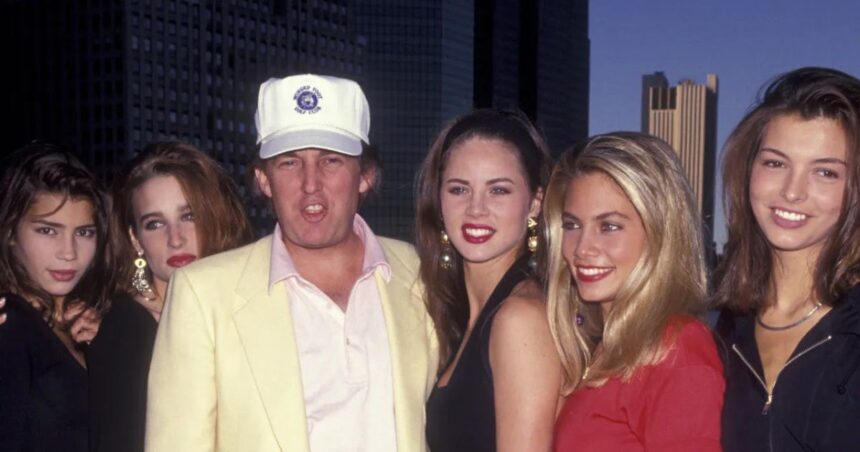Trump, Tiara, and Trouble: The Pageant King Who Couldn’t Be Ignored
It’s one of those celebrity-political factoids that always makes you double-take: Donald J. Trump, the forty-fifth President of the United States, once reigned supreme over the glitziest, most scrutinized cattle-call of beauty in the world—the Miss Universe organization.
For nearly two decades, from 1996 to 2015, the now-former POTUS was the impresario of not just Miss Universe, but also the homegrown Miss USA and Miss Teen USA pageants. This wasn’t just a side hustle; it was a deeply entwined piece of his brand, fitting snugly between his real estate empire and his eventual role as TV’s most notorious boardroom boss. If The Apprentice was his gilded throne, the pageant circuit was his sparkly, occasionally sleazy, proving ground.
But, as with most things Trump, the era of his pageant ownership was less a fairy tale and more a deeply awkward episode of reality television that never quite made it to air. It was a time filled with crown-worthy moments of controversy, culminating in an unceremonious, lawsuit-fueled departure that foreshadowed the chaos of his political ascent. Let’s face it, the man never did anything small, especially not a scandal.

‘Inspecting’ the Dressing Room: The Uninvited Guest
The most consistently eyebrow-raising, flat-out frivolous and yet seriously concerning stories from his pageant years revolve around his purported habits backstage. Specifically, the now-infamous habit of dropping by the dressing rooms while contestants were in varying stages of undress.
As the story goes—confirmed by multiple former contestants—being the owner meant having an all-access pass, a privilege Trump seemed keen to exercise in the most awkward of settings. Imagine the scene: a room full of young women, some mere teenagers competing for Miss Teen USA, mid-hair, mid-makeup, or, well, mid-change, when the owner himself strolls in to “inspect” the proceedings.
The clincher? Trump didn’t just deny it, he bragged about it.
In a 2005 interview with the notorious shock jock Howard Stern, the mogul offered up his own, ahem, defense and justification for the peculiar habit. He admitted that while the contestants were “getting dressed and ready,” and with “no men or anywhere,” he was “allowed to go in because I’m the owner of the pageant and therefore I’m inspecting it.” He followed up that self-awarded permission slip with the line that perfectly encapsulates the entitlement of the moment: “Is everyone okay? Is everybody okay? And you see this incredible-looking woman. And so I sort of get away with things like that.”
“Getting away with things” seemed to be the guiding principle of his pageant ownership.
Meat Market or Miss Market? Contestants Speak Out
The recollections from the women on the receiving end of these “inspections” paint a far less flattering picture than Trump’s own boast.
Samantha Holvey, who was Miss North Carolina in 2006, told CNN her experience was anything but comfortable. She described the feeling of being thoroughly objectified, stating that Trump “would step in front of each girl and look you over from head to toe like we were just meat, we were just sexual objects, that we were not people.”
A similar account came from Tasha Dixon, Miss Arizona 2001, who shared that the future political figure would often walk in on girls when they were “only partially dressed or even undressed.” This wasn’t an isolated accident; it was, according to these accounts, a pattern of behavior that utilized the imbalance of power inherent in the owner-contestant dynamic. For young women striving for their big break, what exactly was the protocol for telling the powerful owner of the entire spectacle to, well, scram? The reality is that the atmosphere of competition and ambition often forces silence, a cultural pattern that the Oli Coleman style of reporting loves to skewer.
This entire saga of the dressing room walk-ins serves as a truly revealing anecdote about the culture fostered under his ownership: a distinct, almost proud disregard for personal boundaries, coupled with a belief that ownership conferred immunity from standard social decency.
The ‘Miss Piggy’ Fiasco: Body Shaming on a Global Stage
While the backstage stories were bubbling under the surface, one incident involving the winner of the 1996 Miss Universe pageant went explosively public, creating a media frenzy decades before social media amplified every slight.
The subject was Alicia Machado, the stunning 19-year-old who represented Venezuela and took home the crown. Post-win, like many normal human beings, she reportedly put on some weight. This, apparently, was an unforgivable offense to the organization’s owner.
The now-infamous moniker he allegedly saddled her with was “Miss Piggy.” The irony of a man known for his own, shall we say, non-athletic build publicly ridiculing a young woman’s weight gain wasn’t lost on observers then or now.
But it didn’t stop there. He leaned into the cruelty, even defending his actions later on Fox and Friends, declaring she was “the worst we ever had…She gained a massive amount of weight. It was a real problem.” He made the pageant’s financial interest in a marketable, strictly-sized beauty queen the public-facing excuse for a truly mean-spirited personal attack. Machado, on the other hand, described a period of intense emotional distress, an unhealthy relationship with food, and years of psychological struggle following the public humiliation.
The Alicia Machado incident became a powerful, recurring flashpoint years later when she was deployed as a campaign surrogate during his first presidential run. The episode perfectly illustrates a pattern: identify a perceived weakness, assign a juvenile, mocking nickname, and broadcast the insult widely. It’s an investigative-lite peek into the playbook that would later define his political communication.
The Final Curtain: NBC Draws the Line
Every dramatic reality show has a season finale, and Trump’s pageant reign came to a spectacular, litigious close in 2015. The exit wasn’t over the dressing room allegations or the body-shaming; it was over a different kind of boundary violation: his comments about Mexican immigrants.
During his presidential campaign kickoff speech, Trump delivered the remarks that would ultimately cost him his contract with NBCUniversal, the longtime broadcaster of the pageants. He declared, “They’re bringing drugs, they’re bringing crime, they’re rapists, and some I assume are good people, but I speak to border guards and they tell us what we are getting.”
The fallout was immediate and decisive. NBC, citing the controversial nature of the statements, announced they would be dropping the annual Miss USA Pageant. Univision, the Spanish-language network, also cut ties. For a television event that relied on mass-market acceptance and corporate sponsorship, the comments were simply too toxic.
In a move that surprised absolutely no one familiar with his business dealings, Trump responded by suing NBC. The ultimate resolution was a messy, high-stakes financial negotiation: he ended up buying out NBCUniversal’s 50% stake in the organization, briefly gaining sole ownership, only to sell the entire Miss Universe Organization to the talent agency WME/IMG (now Endeavor) shortly thereafter. The era was over. The crown had been handed off.
The Celebrity Echo: When the Pattern Repeats
The saga of Donald Trump and the Miss Universe Organization is a perfect case study in the Hollywood-to-Politics pipeline, particularly in how celebrity behavior patterns are simply rebranded, not retired.
The investigative notes here aren’t just about an eccentric billionaire making inappropriate comments; they are about a pattern of using public platforms to control, critique, and comment on women’s bodies and to push boundaries through an inherent power imbalance.
When you look at similar celebrity implosions—think of the myriad stars who’ve been revealed to have toxic workplace cultures (Ellen DeGeneres, anyone?) or who have publicly engaged in body shaming (many an anonymous Hollywood executive)—the pattern is clear: immense power often creates a reality distortion field where normal rules of conduct don’t apply, until the market, or the media, finally says enough.
In Trump’s case, his pageant era wasn’t just a quirky historical footnote; it was a deeply revealing, ironically prescient warm-up act. It taught him the power of shock, the loyalty of a specific kind of audience, and how to weather a media firestorm—lessons he would take right into the Oval Office. He walked off the stage of Miss Universe and onto the global political stage, taking his same brand of flamboyant, boundary-testing spectacle with him. The only difference was that the tiaras and sashes were replaced by flags and rallies.


